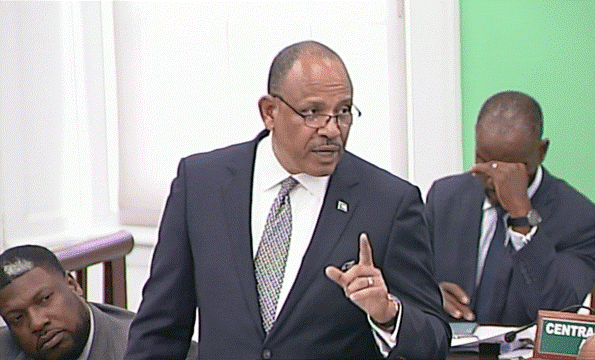
Minister Sands: It is time to increase sex education among young peopleReal education must begin at home, says Minister
NASSAU, BAHAMAS — Following a recent Department of Public Health report that showed an uptick in sexually transmitted diseases among young persons, Minister of Health Dr Duane Sands said yesterday that while he does not want to overstep other ministries’ purview, he acknowledged it is time to increase sexual education among young people.
“We are prepared to discuss a lot of things in this country; like who ‘ga’ win Junkanoo and other things, but when it comes down to critical issues of health and other things we get very, very quiet,” Sands told Eyewitness News Online.
The minister opined that parents have attempted to disassociate sex from young people, but said: “we need to meet our people where they are, as they are, and not pretend as if human sexuality is not real”.
According to the Department of Public Health Surveillance Unit and STI Clinic, there were 2,616 people in The Bahamas who tested positive for Syphilis at least once during between 2014 and 2018.
The report indicated that during the period, cases increased by 63 per cent, from 439 in 2014 to 714 in 2018.
It also noted that there were 816 cases of Chlamydia and 186 cases of Gonorrhea Infection in 2017.
In 2018, there were 1,004 cases of Chlamydia and 265 cases of Gonorrhea.
Sands acknowledged that while HIV and AIDS remain top priorities, there is a need to recalibrate given the trends of certain STIs.
“Not to change or diminish the efforts to reduce HIV, but to ensure that people recognize that Syphilis, Gonorrhea and other sexually transmitted infections go along with HIV and that we should not forget that they have implications as well,” he said.
In a separate interview, University of the Bahamas Dean of Students Joe Stubbs said Bahamians have to get out of the habit of pretending that young persons are not having sex.
“The leaked videos that somehow appear on social media and the conversations that are happening, and the increase in STD rates that skyrocketed recently; If these aren’t evidence that proves our young people are actively engaged in sexual relations, then I don’t know what else we need to show us that,” he said.
“So, I definitely think we need to be having more [realistic] conversations with our young people”.
“We know what you are doing and we can’t stop you from doing it, but we can put measures in places to educate you on making better and wiser decisions”.
Meanwhile, LIFE Worship Center Pastor Denczil Rolle said there is a need now, more than ever, for churches to join the conversation.
“Destruction comes when there is an absence of knowledge,” he said
“So, we have to begin the conversation. The church cannot be afraid”.
“There was a time in church wherein ministry training you were taught to not say the word sex because it creates different impulses in the minds of different persons, but now today, you have to use it.”
WHAT IS PANCAP?
PANCAP is a Caribbean regional partnership of governments, regional civil society organisations, regional institutions and organisations, bilateral and multilateral agencies and contributing donor partners established on 14 February 2001. PANCAP provides a structured and unified approach to the Caribbean’s response to the HIV epidemic, and coordinates the response through the Caribbean Regional Strategic Framework on HIV and AIDS to maximise efficient use of resources and increase impact, mobilise resources and build the capacity of partners.
What are the Global AIDS Strategy 2021–2026 targets and commitments?
If targets and commitments in the strategy are achieved:
- The number of people who newly acquire HIV will decrease from 1.7 million in 2019 to less than 370 000 by 2025
- The number of people dying from AIDS-related illnesses will decrease from 690 000 in 2019 to less than 250 000 in 2025.
- The goal of eliminating new HIV infections among children will see the number of new HIV infections drop from 150,000 in 2019 to less than 22,000 in 2025.
What are the 95-95-95 Targets for ending AIDS?
- 95% of People Living with HIV know their HIV status;
- 95% of people who know their status on treatment; and
- 95% of people on treatment with suppressed viral loads.
HELPFUL LINKS:
Global AIDS Strategy 2021–2026, End Inequalities, End AIDS
https://pancap.org/pancap-documents/global-aids-strategy-2021-2026-end-inequalities-end-aids/
Caribbean Regional Strategic Framework on HIV and AIDS (CRSF) 2019-2025
https://pancap.org/pancap-documents/caribbean-regional-strategic-framework-2019-2025/
